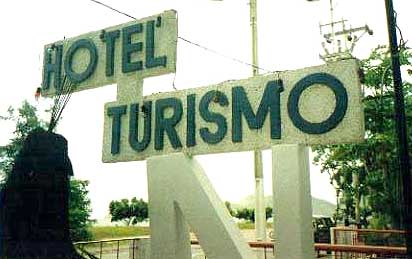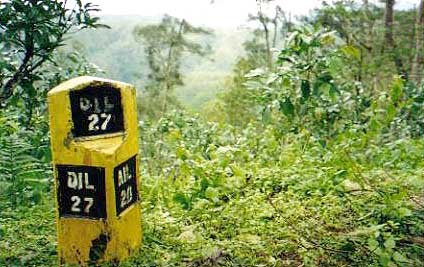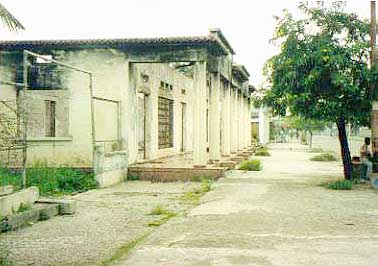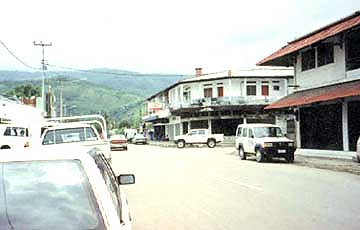Dili Dally (part 1)
DILI, EAST TIMOR
FEBRUARY 14
My streak of unusually good luck went into remission on Valentine's Day, leaving me reliant on the usual -- the kindness of strangers and my own sorely unfit wits.
That's the fun of travel, but only in retrospect. When events occur, they can be trying.

Following my "Indonesia" Lonely Planet guidebook Dili map, I walked out of the Dili wharf area and turned left. There were no taxis -- passengers simply didn't arrive by ship. I walked in the brutal heat and humidity to the Hotel Turismo. According to Lonely Planet, it was where "all the foreigners stayed" and was about five dollars a night.
The guidebook was only a year old, but East Timor was a country in flux. Only the street names remained the same as they were when the book was printed.

"Sorry, we're full," said the young Timorese woman at the front desk. Rooms were $25-50 anyway.
Exhausted, I flung my pack down and asked if I could leave it while I hunted for a hotel. She looked alarmed.
"You don't care?" she asked, wide-eyed.
Two Europeans stepped in, their UN badges swinging from chains around their necks. "She can leave it in our room."
This satisfied everyone. Bag safely stashed, I hunted for accommodation.
Everything was $40-50 a night. I was shocked. Once I left Australia, prices were supposed to plummet. Indonesian hotels were a few dollars a night. Was this the price of UN intervention? How were the locals surviving this accelerated economy?
There was only one solution to the inflated economy and stinking heat. I'd have to get into West Timor and Indonesia as quickly as possible. Instead of looking for a room, I went straight to the tourist office.
The tourist office was vacant and smoke-damaged. Guess there weren't many tourists in Dili these days. I was on my own.

I spotted a convenience store and went in to inquire about buying a Coke. The cashier asked for $2 Australian, and when I pulled out US dollars, he quickly calculated the new price at the official exchange rate and took my $1 instead. No doubt the Coke, like me, had come over on the Arktis Atlantic.
I headed off to the Pelni office. Pelni is the Indonesian shipping line that ferries passengers between the many islands in the archipelago. It started to pour rain. My umbrella and raincoat were both uselessly stashed back in room 32 at the Hotel Turismo.
I stood outside the Pelni office, sheltered by the umbrella of a friendly Timorese mom and her daughter. It was closed, and now a family lived in the building. Some Timorese men had taken shelter from the rain under a nearby eave, attached to a burned skeleton of a home. They motioned to me to join them. I excused myself from the mom and ran to the eave.
The men were friendly. They pointed to the Pelni office and said, "no more." Pelni had quit coming.

The rain slowed so I headed to the bus agents. UN SUV's were everywhere -- Indian Ta-Ta's that resembled knock-off Land Rovers. One of them, full of Australian soldiers carrying semi-automatic weapons, stopped to give me a lift.
The soldiers were stationed out in the country and were on leave in Dili. They were hunting for souvenirs -- nice weavings and cloth bags. They dropped me off near the market. They were going to the market too, but had to go to UN headquarters first to get permission.

The buses were easy to find. Minibuses, full of locals, were bound for the nearby town of Baucau. None of them listed "Kupang" as a destination. I asked around, and within minutes created complete chaos as everyone crowded around to try to convey his or her idea of how I could reach Kupang in West Timor. Eventually, one of my new pals decided that I should go to the Tasitolo bus terminal, located near the airport. Satisfied and in agreement, the locals hailed a taxi, bundled me in, yelled "Tasitolo" at the driver, and off we went.
We passed brand new construction, burned-out buildings, and more UN vehicles as we headed to Tasitolo. Finally, my driver pulled over.
"Tasitolo," he said, pointing to a big UN complex.
I was doubtful. That was no bus station. Still, I was getting frustrated and had made no progress. I'd go in and inquire.
"May I help you?" asked an Australian soldier.
"Yes, I'm trying to find the bus station and my taxi driver has brought me here. I'm trying to find out if there's a way to Kupang."
He told me that this particular UN building used to be the bus station, but now there were no buses to Kupang. I'd have to go to the border to catch a Kupang bus. He escorted me to another soldier, who used her cell phone to make a few phone calls to the UN "movements" people. I listened to one-side of the conversation, and could only imagine how the other person was responding.
"We have this American tourist here (laughs), and she wants to go to West Timor. Is that possible? (laughs) Right, I see. G'day."
She hung up and looked at me, the frivolous American out for a Sunday stroll in a war zone.
"You cannot go by bus. It is possible for a local but not for westerner. You'd get over the border, the militias would assume that you were UN, and they wouldn't believe that you weren't. You'd be kidnapped or murdered and there's nothing we could do to protect you. All of this is IF you could convince the border guards on our side to stamp you out, which they probably wouldn't. All I can suggest is that you go back to Darwin and fly to Kupang from there."
Shit.
My confidence that "there must be a way" wavered. But perhaps the UN was overstating the case. Regardless, I was running out of options. No ship, no bus, no hotel. I went back to my taxi and told him to take me back to the Hotel Turismo. I'd collect my bag, pay the $50 a night at a crummy hotel, and hope that something would come up.
Then the taxi driver, a 17-year-old who didn't know much English, asked me to stay in East Timor.
"We need more civilians, people like you," he explained. He motioned at some nearby UN solidiers. "We do not trust the military. Military killed my family... my father, my mother, my younger sister, my older brother. All killed."
The East Timorese, traumatized by militias, trusted no one in a uniform. I nodded politely, not sure how to continue the conversation in our limited common vocabulary.

Back at the Hotel Turismo, I collected my pack and sat down in reception to wait for the rain to stop. I didn't know what to do. Was it unsafe like the UN said? Was it easy, like the Indonesian Consulate back in Darwin had told me? I started to think aloud, and addressed an Australian guy standing by the front desk. I had gotten to where I'd say anything to anybody, to hell with their opinion.
Fortunately, John the Australian turned out to be sympathetic.
"I don't know if it's safe, but Danny will know."
He stopped his friend Mario, a Timorese man who had materialized nearby. Mario was quite sure that it wasn't safe to take the bus. He reeled off the possible horrors -- kidnapping, murder, rape, they will think you're UN... shoot first, ask questions.
But Mario had an idea. "What if," he suggested, "you went through the islands?"
I could take the daily ferry to the Timorese island of Ataura, and from there could take a speedboat to the Indonesian island of Aloo. No, it wasn't strictly legal.
"Danny will know if you can do that," he said confidently.
Mario and John loaded me into a pickup truck. Mario put my pack behind the front desk and this time the receptionist took it gladly. We dropped John off to wait at a coffee shop, and Mario drove me back to the wharf to meet the famous Danny.
Danny and his friend Lorenzo discussed my situation in depth with Mario. I couldn't understand their animated conversation, but occasionally Mario would translate a few sentences for me.
It would take me $100, a ferry ride, and ten hours in a speedboat. The ferry ride to Atauro was easy, but no one knew the smuggler who would take me in a speedboat, so they couldn't guarantee my safety. This gave everyone pause and they looked at me, considering my blondeness and femaleness. I had one of those "damn, I wish I was a man" moments.
Some more discussion continued. Then, a new problem arose.
There was no Customs this way. I'd be visa-less in Indonesia, an illegal alien. I could possibly risk my safety with the speedboat driver, but I couldn't very well run around Indonesia illegally. Would I be fined, imprisoned, or even repatriated to the US at my own expense?
Danny and Lorenzo agreed that the bus from the border was out. I'd be raped/abducted/shot/murdered/painted blue... the list of horrors was becoming tedious, and I was skeptical anyway. When was the last time someone tried it? No one was sure, but there had been a bad unspecified incident in September.
Everyone finally agreed. I must fly to Kupang or Bali.
Discouraged, I agreed to fly. Lorenzo wrote me a note to give to the head of the airline. I think it was some kind of "give this nice American a fine discount out of respect for the time we were Boy Scouts together" note, but I couldn't read it.
Mario drove me back to Turismo.
"Where are you staying?" he asked.
"I don't know. Maybe Hotel Dili. Hotel Turismo is full." I was going to stay at the first place with a room. I didn't care any more.
"I know," he laughed. "I am the owner."
I was astonished. He was quick to add that he was only one of three owners.
Ten minutes later I was installed in a little cement room in the back of Hotel Turismo, where the staff was housed. It wasn't much of a room, and I'd have to share the bathroom with Mark, the 37-year-old Kiwi cook, but it was safe and clean. And free. Mario had taken pity on poor, hapless me.
I sat in the hotel garden eating tasty chicken kiev cooked by my neighbor. I was surrounded by UN workers. One of them, Bernadette, picked me out immediately.
"Are you a tourist?" she said. "You are, aren't you!? I've spotted five altogether."
Bernadette was an Australian UN volunteer who had been around since "independence day" in 1999. She had been in East Timor to watch the elections, and lived through the bloody chaos afterwards. She'd seen blood and given last rites, but to her credit, was still good-natured and optimistic. She was the kind of person whose enthusiasm and work towards a better world made me feel guilty for wasting my life putting out comic books.
"I know the harbor master," said Bernadette. "I'll call him tomorrow. Maybe there's a ship."

Timor kids
Tim, her friend, had joined us. He was head of the UN's Kupang office and said he'd make a few phone calls. Maybe he could find out if any of the borders were safe.
John pulled me aside then and complained that the UN had "hijacked" me. I apologized to Bernadette and Tim and joined John, Lorenzo, Mario, and Mark at a different table. They were drinking, and Mario was teasing a fellow from East Timor Fuel. Mario had a plan to go into the fuel business and he relentlessly poked and prodded the fuel guy, as he tried to find out the competition's minimum price. Dili was like that. It was wide open with opportunity, and the rules were what you made them. In the world of disorganization, surely there was infrastructure to be built and money to be made.
Tired of listening to everyone's business plans, I retired to my little room. My twelve hours in Dili had been exhausting.
NEXT: Dili Dally (part 2)